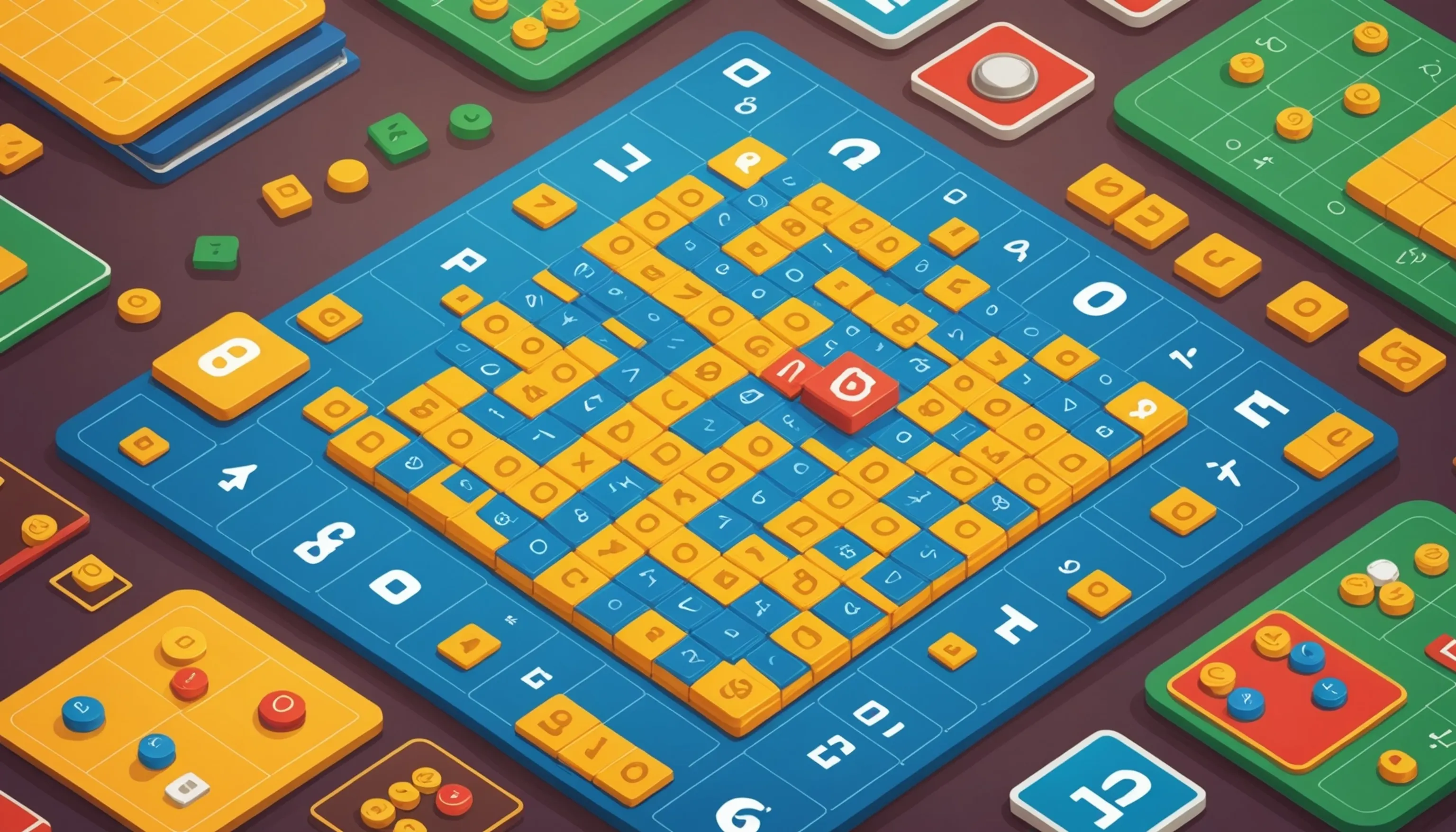Boost Your Kids' IQ with Math Games
 HvWHenry van Wagenberg
HvWHenry van Wagenberg
Boost Your Kids' IQ with Math Games
Boosting your kids' IQ with math games is an effective strategy that combines learning with fun. Engaging in these games not only enhances their mathematical skills but also develops critical thinking and problem-solving abilities. Studies indicate that playing math games can significantly improve cognitive functions, leading to better academic performance.
Moreover, these games can foster a love for mathematics, making it less intimidating for teenagers. By incorporating math games into their routine, parents and teachers can create a stimulating environment that encourages continuous learning and intellectual growth.
Benefits of Math Games for Teenagers
Math games offer numerous benefits for teenagers, making them an essential tool in enhancing both skills and cognitive development. Firstly, these games make learning math enjoyable, which can increase motivation and reduce anxiety often associated with the subject. When teenagers engage in playful learning, they are more likely to participate actively, leading to a deeper understanding of mathematical concepts.
Moreover, math games can improve critical thinking and problem-solving abilities. As students tackle various challenges within the games, they learn to approach problems from different angles and develop strategies to find solutions. This skill set is invaluable not only in math but across all subjects and real-life situations.
Additionally, playing math games encourages teamwork and social interaction. Many games can be played in groups, promoting collaboration and communication among peers. This social aspect helps teenagers build important relationships and soft skills that are crucial for their future.
Another significant benefit is the ability to track progress. Many math games offer performance analytics, allowing both parents and teachers to monitor improvement over time. This feedback can help identify areas where a teenager might need additional support or practice.
Lastly, math games foster a growth mindset, teaching teenagers that effort and practice lead to improvement. By experiencing both success and failure in a low-pressure environment, they learn resilience and perseverance, essential qualities for academic success and life beyond school.

Types of Math Games to Enhance IQ
There are various types of math games designed to enhance IQ and mathematical skills for teenagers. Each game type targets different aspects of math learning while keeping the experience engaging and enjoyable.
1. **Puzzle Games**: These games challenge students to solve mathematical puzzles, enhancing their logical reasoning and problem-solving abilities. Examples include Sudoku and logic puzzles, which require critical thinking and strategic planning.
2. **Board Games**: Traditional board games like Monopoly or chess incorporate math in a fun way. They help teenagers practice addition, subtraction, and strategy while playing with friends or family, making math a social activity.
3. **Online Math Games**: There are numerous websites and apps that offer interactive math games tailored to various skill levels. These platforms often provide instant feedback, enabling students to learn from their mistakes while tracking progress. Examples include Prodigy Math and Mathletics.
4. **Card Games**: Simple card games, such as Math War or 24, require players to use arithmetic skills to win. These games can be played with family or friends and encourage quick thinking and mental math practice.
5. **Math Challenges and Competitions**: Engaging in math challenges, whether at school or online, can motivate teenagers to improve their skills. These competitions often have fun formats, such as timed quizzes or team-based events, which foster a competitive spirit.
By incorporating a variety of these math games into learning, parents and teachers can create a rich environment that not only improves math skills but also enhances overall IQ.
How to Integrate Math Games into Learning
Integrating math games into learning can be a seamless process with a few strategic approaches. Start by selecting games that align with the curriculum, ensuring they reinforce the concepts being taught. Schedule regular game sessions, making them a fun part of daily or weekly routines.
Encourage collaboration by allowing teenagers to play in pairs or small groups, promoting teamwork and discussion. Use online platforms that track progress, providing instant feedback to motivate learners. Lastly, celebrate achievements, whether big or small, to foster a positive attitude toward math and enhance engagement in the learning process.

Creating a Fun Learning Environment
Creating a fun learning environment is essential for engaging teenagers, especially when it comes to subjects like math. Here are several strategies to ensure that learning remains enjoyable and effective.
Firstly, incorporate elements of play into the learning process. This could involve using math games that encourage competition and teamwork. Games create a relaxed atmosphere, allowing students to enjoy the learning experience while still challenging their skills.
Next, personalize the learning space. Allow students to contribute to the classroom setup by choosing decorations or organizing study areas. A colorful and inviting environment can enhance mood and motivation. Adding math-related posters or visual aids can spark interest and make concepts more relatable.
Additionally, vary teaching methods to cater to different learning styles. Use interactive lessons that include hands-on activities, group discussions, and technology integration. For instance, online math games or apps can provide a dynamic learning experience that resonates with tech-savvy teens.
Encouraging a positive classroom culture is also crucial. Celebrate successes, no matter how small, and provide constructive feedback. Establishing a supportive atmosphere where students feel comfortable making mistakes fosters resilience and a growth mindset.
Finally, involve parents in the learning process. Share resources and game recommendations that they can use at home, reinforcing what is taught in class. By creating a collaborative and enjoyable learning environment, educators can significantly enhance students’ engagement and enthusiasm for math.
Recommended Math Games for Teenagers
When it comes to enhancing math skills, there are several recommended math games that teenagers will find both enjoyable and educational. These games cater to various skill levels and learning preferences, ensuring that every student can benefit.
1. **Prodigy Math**: This online platform offers a fun, interactive role-playing game where students can practice math concepts aligned with their curriculum. As they progress through quests, they solve math problems to earn rewards, making learning engaging.
2. **Mathletics**: A comprehensive online resource that combines learning and play. Mathletics features various activities and games that cover a range of topics, allowing students to practice at their own pace while tracking their progress.
3. **Cool Math Games**: A website filled with a wide variety of math-based games that make learning fun. From logic puzzles to strategy games, Cool Math Games encourages critical thinking and problem-solving while keeping students entertained.
4. **24 Game**: This classic card game challenges players to use basic arithmetic operations to make the number 24 from four given numbers. It's great for developing mental math skills and quick thinking.
5. **Math Blaster**: A fun, action-packed game that combines adventure with math challenges. Players complete math tasks to advance in the game, helping them build confidence in their skills.
By incorporating these recommended math games into learning routines, parents and teachers can provide a stimulating educational experience that boosts teenagers' math skills while keeping them engaged and motivated.
Tracking Progress and Improvement
Tracking progress and improvement in math skills is vital for effective learning. Regularly assessing students’ performance allows parents and teachers to identify strengths and areas needing focus. One effective method is to use analytics provided by online math games, which offer insights into individual performance and growth over time.
Additionally, maintaining a progress journal can help students reflect on their learning journey, celebrating milestones and setting new goals. Frequent quizzes or informal assessments can also gauge understanding. By actively monitoring progress, educators can tailor support, ensuring that teenagers remain motivated and engaged in their math learning.
Setting Goals for Math Game Play
Setting goals for math game play is an effective way to enhance motivation and focus among teenagers. Clear, achievable goals provide direction and encourage consistent effort in improving math skills. Here are some strategies to establish effective goals:
1. **SMART Goals**: Encourage students to set SMART goals: Specific, Measurable, Achievable, Relevant, and Time-bound. For instance, a student might aim to complete three levels of a math game within a week, ensuring the goal is clear and attainable.
2. **Skill Focus**: Identify specific areas where improvement is needed, such as algebra or geometry. Set goals that target these skills through relevant games. For example, if a teenager struggles with fractions, they could aim to play a fraction-focused math game for 30 minutes each week.
3. **Progress Tracking**: Have students regularly monitor their progress towards their goals. This could involve keeping a log of game time, scores, or completed levels. By visualizing their achievements, students can stay motivated and recognize their improvement.
4. **Incorporate Rewards**: Establish a reward system for achieving goals. Rewards can be simple, such as extra screen time or a small treat. This positive reinforcement encourages continued participation and effort in math games.
5. **Reflect and Adjust**: Encourage students to reflect on their goals periodically. If a goal feels too easy or too challenging, help them adjust it for continued growth. By setting and refining goals, teenagers can foster a sense of accomplishment and develop a lifelong love for math.
Using Rewards to Motivate Learning
Using rewards to motivate learning can significantly enhance teenagers' engagement with math games. By establishing a reward system, parents and teachers can create an environment where students feel recognized for their efforts. Here are several effective strategies to implement rewards:
1. **Identify Rewards**: Determine what motivates the individual student. This could include:
- Extra screen time for playing games
- Small treats or snacks
- Gift cards or fun outings
- Choosing a family activity or movie night
2. **Set Clear Criteria**: Clearly outline the achievements that will earn rewards. These could include:
- Completing a certain number of levels in a math game
- Improving scores or accuracy
- Consistent practice over a set period
3. **Immediate Feedback**: Provide rewards shortly after achieving a goal. Immediate recognition helps reinforce positive behavior and keeps motivation high. For example, if a student finishes a math challenge successfully, they could receive their reward right away.
4. **Track Progress**: Use charts or apps to visually track achievements. Seeing progress can be a motivating factor in itself, as students can visualize their accomplishments and understand how close they are to receiving their rewards.
5. **Mix It Up**: Change rewards periodically to keep motivation fresh. This can prevent students from losing interest and make each achievement feel special.
By effectively using rewards, educators and parents can create a motivating atmosphere that encourages teenagers to engage with math games and improve their skills.
